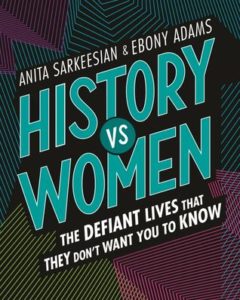
History vs Women: The Defiant Lives That They Don’t Want You to Know

Anita Sarkeesian
You have done extensive studies and coverage of the role of women in video games. What trope do you think is the most overused and hazardous to young female gamers?
It’s hard to pinpoint one singular gaming trope that is “the” problem. Feminist Frequency’s Tropes vs Women in Video Games spanned over a dozen episodes (and we could have made even more!) because there are so many harmful ways that video game mechanics and narratives work to dehumanize, debase, and devalue female characters. Some of those tropes are glaringly obvious, gruesome, and horrifying, such as the numerous and creative ways that games utilize violence against women. Some tropes are more subtle and insidious, such as the routine way women’s bodies are sexualized. But whether it’s extreme or subtle, these harmful tropes all work to reinforce stereotypes and myths about women that, over time, and over all forms of media, have an impact on how women are viewed and treated.
Which woman’s story affected you most when researching your book?
There are so many fascinating women profiled in History vs Women, but one that stands out for me is Lois Weber. Weber was a filmmaking pioneer whose prolific work, especially during the silent era, was highly revered and celebrated. Learning about Weber will probably be a surprise for many people, because it is not widely known just how common it was for women to be involved in the early days of filmmaking. But the reason her story affected me so deeply is that while her name was listed as one of the greatest directors of the medium, alongside men such as D.W. Griffith, we remember his name but not hers, despite our modern recognition that his work trafficked in horrifically racist imagery. (Weber’s own racial and religious biases also made it onto the screen). Not only is Weber largely forgotten today, many decades after her era, but Weber was all but forgotten during her own lifetime. It is crucial to excavate her story and others like hers so we have a fuller picture of the past — the good and the bad — and we don’t use our fractured history to justify further oppression in the future.
Our festival slogan is “Read Everything.” What one book would you like to see on our official Read Everything list for 2018?
For many years I claimed to hate fantasy, whether it was novels, movies, video/tabletop games because all the stories seemed to be the same. I just couldn’t bother with a world full of all white people, mostly men, fighting for a throne or killing orcs over and over again. It just wasn’t my thing. It wasn’t until I was introduced to Rosemary Kirstein’s The Steerswoman Series that I changed my tune. This series, one of my all time favourites, showed me that fantasy doesn’t all have to be inspired by Tolkien but can and does reflect the perspectives and worldviews of other folks. Fantasy can be so much more. Kirstein’s series is about a grand quest: it involves wizards and fighting and other storytelling devices you’d expect from a fantasy novel but with such a fascinating, original story and with intensely compelling characters and mythologies. I can’t recommend it enough.